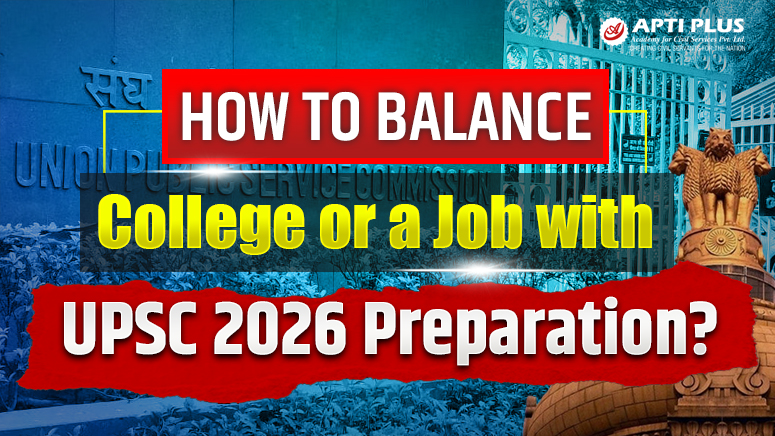




The Union Public Service Commission (UPSC) Civil Services Examination is one of the most prestigious yet demanding competitive exams in India. Lakhs of aspirants apply every year, but only a select few make it through the three-stage process, Prelims, Mains, and Interview. For those who are either in college or managing a full-time job, preparing for UPSC 2026 can seem overwhelming.
But the good news is it’s absolutely possible to crack UPSC while studying or working, provided you adopt the right strategy, mindset, and discipline. This guide will help you understand how to strike the right balance and maximize your productivity without burning out.
Preparing for UPSC while attending college or holding a full-time job comes with its own set of difficulties:
Despite their busy schedules, working people have certain benefits that can help them prepare for the UPSC.
Creating a realistic study schedule is one of the best strategies to manage your employment with UPSC preparation. Analyze the UPSC curriculum and decide what you want to do so that you can allocate your time effectively.
Once you've reviewed the curriculum, set aside a specified number of hours per day to study. It could take an hour or two, depending on your work schedule. After that, establish realistic targets and devise an action plan. Remember that consistency is crucial.
Continuously monitor and analyze your performance and progress. Depending on how far you get, you may need to adjust your study hours. It may appear boring, but it is an effective approach to ensure that you are making progress while avoiding distractions. Things do not always according to plan. If you have a hectic day at work, you may need to change your study plan. If you have to miss one or two study sessions, don't be too hard on yourself.
|
Time Slot |
Study Session |
Activity |
|
6:00 AM - 7:30 AM |
Morning Session |
|
|
8:00 AM - 9:00 AM |
During Commute |
|
|
1:00 PM - 1:30 PM |
Afternoon Session (Lunch Break) |
|
|
7:00 PM - 8:30 PM |
Evening Session |
|
|
8:30 PM- 9:00 PM |
Dinner Break |
|
|
9:00 PM - 10:30 PM |
Night Session |
|
|
10:30 PM - 11:00 PM |
Light Reading or Meditation |
|
Block fixed time slots every day for specific tasks like:
Even 3-4 focused hours a day can produce great results over time.
Study for 60 minutes, take a 10-minute break. This improves focus and retention.
Start exploring optional subjects by the second year, and finalize by the third year. Choosing early helps with better time distribution.
You can make substantial progress in your UPSC preparation while working full-time by strategically managing your weekends. But how can you improve your study regimen, especially given the limited time you have during the week? The solution rests on using the potential of online and technical resources. With the correct resources like test series bby APTI PLUS, you can convert even a few idle minutes into productive study time.
Online resources like Abhyudaya Test series by APTI PLUS provide structured study, expert advice, and a thorough review of the course. With extensive modules, engaging content, and expert insights, these courses can help you lay a solid foundation and stay on track.
Mock tests are essential for tracking your progress and becoming comfortable with exam settings. Online mock tests like the one by the APTI PLUS, the best coaching institute in Kolkata, can help you. Taking a practice test on the weekend might highlight which areas you need to work on, giving you a clear direction for your study sessions.
Balancing college or a job with UPSC preparation is tough, but not unachievable. Remember, it’s not about studying 10 hours a day, it’s about studying smart, staying consistent, and managing time efficiently.
Start small, build momentum, and stay focused. With the right mindset, preparation strategy, and a never-give-up attitude, UPSC 2026 can be your year.
© 2026 iasgyan. All right reserved